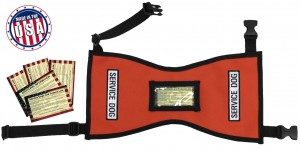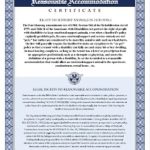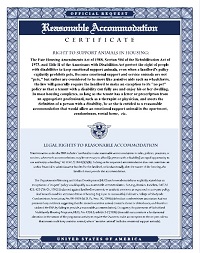Fake ESA Letters
Scammers Perpetuate Confusion and Harm Legitimate Emotional Support Animal and Service Dog Handlers Rights
What is a Fake ESA Letter?

Misrepresenting your pet as a service dog is illegal
There are many ways to get a legitimate ESA Letter or certification online, but it’s a risky business determining if that service is legal. You can buy an “undisputable emotional support animal registration” kit from online retailers, for example, one $160 kit includes:
- a laminated ID Card
- your choice of “service dog” engraved tags
- an OfficeMax-quality certificate (your free ESA letter)
- red leash
- optional “service animal” vest
 Another self-approved “official” outfit offers a $283 kit with:
Another self-approved “official” outfit offers a $283 kit with:
- a free registration letter (VALID IN ALL 50 STATES – if they don’t say so themselves)
- free reasonable accommodation housing certificate for landlords (your free support animal letter to landlord)
- a service dog fact book
- added to their database for $45
- a Photo ID Card for $54
- a Handler Photo ID Card for $55
- digital ID card for $25
- a self-approved red vest to identify your dog in public as a “service dog” for up to $95 (with ‘federal law cards’)
- an engraved medical “service dog” tag with registration number
- pay online with a $9 processing fee
Both kits include the potential for violating state and federal laws with a misdemeanor charge or $500 fine for free!
The ESA registration letters that you just ordered, by the way, don’t do anything but waste paper. Point in fact, for a document to be a reasonable housing accommodation request that complies with the Fair Housing Act, it must be a letter from your psychiatrist
- on their letterhead,
- with their statement of treatment (for example, identifying the term),
- legal diagnosis (not the diagnosis or details, just that the tenant has a diagnosis),
- and that the emotional support animal prescription is the most effective form of treatment to alleviate symptoms of their disability.
The letter could also include the doctor’s license number for verification.
Touch offers ESA letters for housing for patients whose regular therapists do not issue ESA letters.
Granted, the latter self-approved outfit does have a disclaimer at the top of each page in their checkout process, stating that they hope you use this purchase responsibly. But they also insist that identifying your pet as a service dog in public is very important, and recommend a vest, ID card and tag, which is illegal in most states to misrepresent your pet as a service dog.
Here’s the thing about identifying your service dog: An emotional support animal is not a service animal. Nearly every state has laws that prohibit service animal misrepresentation.
- California: Anyone who knowingly and fraudulently represents himself or herself, through verbal or written notice, to be the owner or trainer of dog licensed as, to be qualified as, or identified as, a guide, signal, or service dog is guilty of a misdemeanor punishable by imprisonment in the county jail for up to six months, by a fine of up to $1,000, or both.
- Texas: A person who uses a service animal with a harness or leash of the type commonly used by persons with disabilities who use trained animals, in order to represent that his or her animal is a specially trained service animal when training has not in fact been provided, is guilty of a misdemeanor punishable by a fine of up to $300 and 30 hours of community service to a governmental entity or nonprofit organization that primarily serves persons with disabilities
- Florida: A person who knowingly and willfully misrepresents herself or himself, through conduct or verbal or written notice, as using a service animal and being qualified to use a service animal or as a trainer of a service animal commits a misdemeanor of the second degree, punishable by imprisonment up to 60 days or fined up to $500 and must perform 30 hours of community service for an organization that serves individuals with disabilities, within 6 months.
- Michigan: A person who is not identified as having a disability according to the ADA, or a veteran with PTSD, traumatic brain injury or service-related disability, and falsely represents that he or she is in possession of a service animal, or a service animal in training, in any public place shall be guilty of a misdemeanor and punishable by imprisonment up to 90 days, a fine up to $500 and/or 30 days community service.
- New York: It is a violation for anyone to knowingly affix to any dog any false or improper special tag for identifying guide, service, or hearing dogs, or purebred license tags. It is a violation for any owner of a dog to fail to properly handle a dog or if the handling results in harming another dog that is a guide, hearing or service dog. A first offense is punishable by a fine of not less than $25.
- Washington: “White Cane Law” It is a misdemeanor for any pedestrian who is not totally or partially blind, hearing impaired, or otherwise physically disabled to use a guide dog or other service animal in any public accommodation or means of transportation to secure the rights and privileges afforded to physically disabled people.
Other Laws:- Any person who has received notice that his or her behavior is interfering with the use of a dog guide or service animal who continues with reckless disregard to interfere with the use of a dog guide or service animal by obstructing, intimidating, or otherwise jeopardizing the safety of the dog guide or service animal user or his or her dog guide or service animal is guilty of a misdemeanor.
- Any person who allows his or her dog to interfere with the use of a dog guide or service animal by obstructing, intimidating, or otherwise jeopardizing the safety of the dog guide or user or his or her guide or service dog is guilty of a misdemeanor.
- It is a gross misdemeanor for any person who injures, disables, or causes the death of a guide or service dog or allows their dog to injure, disable or cause the death of a service animal.
- He or she shall also be ordered to make full restitution for all damages, including incidental and consequential expenses incurred by the dog guide or service animal user and the dog guide or service animal which arise out of or are related to the criminal offense. Restitution shall include replacement, training of a replacement guide dog or service dog, or retraining of the affected service animal and all related veterinary and care expenses; and medical expenses of the guide dog or service animal handler, training of the guide dog or service animal handler and compensation for wages or earned income lost by the service dog handler.
- North Carolina: It is a class 3 misdemeanor to disguise a dog as service animal.
- Arizona: Proposed in December, A PERSON MAY NOT FRAUDULENTLY MISREPRESENT AN ANIMAL AS A SERVICE ANIMAL OR SERVICE ANIMAL IN TRAINING TO A PERSON OR ENTITY THAT OPERATES A PUBLIC PLACE. A COURT OR DULY APPOINTED HEARING OFFICER MAY IMPOSE ON THE PERSON MISREPRESENTING THE ANIMAL IN VIOLATION OF THIS SUBSECTION A CIVIL PENALTY OF TWO HUNDRED FIFTY DOLLARS.
- Colorado: It is a petty criminal offense for a person to intentionally misrepresent entitlement to an assistance animal, or the person intentionally misrepresents an animal in his or her possession as a service animal or service-animal-in-training for the purpose of obtaining any of the rights or privileges set forth in state or federal law for an individual with a disability as a reasonable accommodation in housing; the person was previously given a written or verbal warning regarding the fact that it is illegal to intentionally misrepresent entitlement to an assistance animal; and the person knows that he or she does not have a disability or that the animal is not an assistance animal. A first offense is punishable by a fine of $45. Subsequent offenses are punishable by a fine of between $50 and $500.
- Nevada: it is a misdemeanor punishable by a fine of up to $500 for a person to fraudulently misrepresent an animal as a service animal or service animal-in- training
- Delaware: It is a Class B misdemeanor to intentionally interfere with the use of a service dog by obstructing, intimidating or otherwise jeopardizing the safety of the handler or animal; It is a Class A misdemeanor to intentionally injure or disable a service dog.
- Minnesota: Proposed
Separate measures in the state House and Senate would make it a petty misdemeanor, punishable with a $100 fine, to pass off a pet as a trained assistance animal. Subsequent infractions are considered misdemeanors under the bills.
These are just a few pieces of evidence that illustrate the importance of having a properly trained support animal if you plan to take care of them in your home, or out of the house in any legal sense. TouchESA.com always recommends the American Kennel Club’s Good Canine Citizen training, or any training offered by your local pet store.
Furthermore, there is no such thing as a service dog registry or certification. The U.S. Department of Justice does not recognize any entity or organization’s registration database as proof that the dog is a service animal. A college or local government may offer a voluntary service dog registration, but cannot require it.
Support Animal (ESA) & Service Dog Confusion Among Small Businesses
With these emotional support animal registration and certification services selling ESA dog vests and tags, the problem of misrepresented service animals in public is prolific and harmful to the disabled who need legitimate service animals.
 The public then suspects those physically mentally disabled tenants, travelers and patrons who have a service animal of being fakers. When a poorly equipped dog owner takes their pet into a public establishment, particularly an untrained, ill-mannered dog, the business becomes victim of a crime. No one wants to eat in a restaurant with a begging, barking dog.
The public then suspects those physically mentally disabled tenants, travelers and patrons who have a service animal of being fakers. When a poorly equipped dog owner takes their pet into a public establishment, particularly an untrained, ill-mannered dog, the business becomes victim of a crime. No one wants to eat in a restaurant with a begging, barking dog.
The business knows that they must comply with the ADA law, but don’t know the details. They just know they cannot ask them to leave, and they cannot ask them for identification. Employees that had bad experiences then begin to treat proper service dogs and their handlers rudely, crudely, and hostile. Then the business loses another regular customer.
Some things that business owners may not know include:
- Emotional support animals, therapy animals, companion or comfort animals are NOT service animals.
- If the handler or trainer trained the dog to perform a specific function, then they ARE a service dog, if training is complete. (Check your local and state laws for exceptions.)
- Service animals are NOT required to wear vests, IDs, tags, or harnesses.
- If it is not obvious that the dog is a trained service animal, staff may ask: 1) if the dog is a service animal that is required because of a disability, and 2) what work the dog has been trained to perform. They can NOT ask for documentation or demonstration or inquire about the nature of the person’s disability.
- If a service dog is out of control and the handler does not take effective action to control it, or if it is not housebroken, staff may request that the animal be removed from the premises.
There are additional laws under the ADA that are specific to restaurants, hotels, hospitals, and emergency services that you may learn about in their Service Animal FAQ. Don’t miss the part about the online support animal certification and registration services:
There are … organizations that sell service animal certification or registration documents online. These documents do not convey any rights under the ADA and the Department of Justice does not recognize them as proof that the dog is a service animal.
Fake service dogs also create victims of legitimate service dogs, by behavior, reputation, or outright attacking them. This disrupts the animal’s ability to perform the work that they were trained to do, and could put their handler in life-threatening situations, or otherwise mistaken or misjudged as just another dog that will defecate in the aisle of the grocery store. When the service dog is the victim, so is the handler – if the establishments ban them, or the public disrupts their process, the handler then is unable to care for their self. If a restaurant or grocery store prohibits them from entering, their opportunities for living a normal life become severely limited.
Apartment Owners and Managers Emotional Support Animal Concerns
Managers and landlords are afraid to violate the Federal Housing Administration’s Fair Housing Act because it expressly prohibits them from asking for details about the resident’s disability.
However, landlords can seek to confirm the authenticity of an ESA letter. The documentation must be reliable, as previously mentioned, and is permitted by law. The landlord can decline reasonable accommodation if the letters have no scientific or medical support, as in the case of the free “reasonable housing certificate” from the aforementioned internet vendor.
Landlords can also verify by phone, or by verifying valid credentials of the letter-writer. Some states have License lookups online, for example, the Wisconsin Department of Safety and Professional Services offers an online Credential/Licensing Search for Health/Individual, Organizational and Trades Credentials and licenses.
TouchESA.com offers Telephone verification and custom landlord forms for current customers. Fill out our psychological questionnaire at checkout, or log in to purchase additional options.
A landlord can ask about the nature of a disability when it is not already obvious so that they are aware of the nexus – the relationship between the disability and emotional support animal prescription accommodation. There must be sufficient basis for establishing a disability as legally defined by the FHA. A moral handicap is not a disability; neither are all mental impairments.
Therapeutic Benefits
 The Human-Animal Bond Research Institute (HABRI) assembles and conducts research to demonstrate how pets improve health. There is some evidence that shows that pets improve heart health; alleviate depression; increase well-being; support child health and development; and contribute to healthy aging. In addition, companion animals can assist in the treatment of a broad range of conditions from post-traumatic stress to Alzheimer’s disease to autism spectrum disorder.
The Human-Animal Bond Research Institute (HABRI) assembles and conducts research to demonstrate how pets improve health. There is some evidence that shows that pets improve heart health; alleviate depression; increase well-being; support child health and development; and contribute to healthy aging. In addition, companion animals can assist in the treatment of a broad range of conditions from post-traumatic stress to Alzheimer’s disease to autism spectrum disorder.
For example, one study [1] examined the effects of dog ownership on well-being and found that Dog ownership is associated with lower depression among women, and that dog ownership is more beneficial for single persons. Studies also indicate that effects vary by individual.
Investing in a compatible pet can increase social networks and sense of social support.
Learn more about the research results and the effects of pets on mental health, anxiety, and depression at HABRI.
Moving Forward
While some people have visible disabilities, it is important to respect the need for therapy and allow your right to treatment when your disability is not visible.
If you have a service animal, the public may ask if the animal is needed for a disability, and what your service dog is trained to do.
If you have an emotional support animal:
- don’t take your ESA to a restaurant
- don’t take your ESA into the grocery store
- don’t fall for online scams that could land you in jail
- do share what you learn with others to stop the harm that misinformation causes
If you have a pet:
- do share your pet with others
- take care and training seriously
- respect other animals in public
If you have a legitimate need for a real ESA letter, contact Touch for your support animal prescription and letter to your landlord. Our licensed psychiatrist will fill out your required housing and airline forms as needed.

